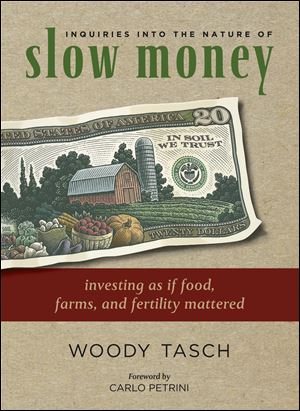
'Slow Money Alliance' creator pushes cause in Ohio
2/14/2012
Slow Money Alliance founder and chairman Woody Tasch authors Slow Money, a national effort to encourage sustainable financial investments that support local, community-based food and farm businesses.
The best description of slow money, said Woody Tasch, who coined the term and started the Slow Money Alliance, is that it is the opposite of fast money. And the best way to think about fast money is to first consider fast food.
Its detractors say that fast food is corporate, standardized, unhealthy, and often harmful to the environment. In rebellion against the fast-food culture, a small but growing population around the world is now actively living the slow food lifestyle -- organic foods, freshly grown on local farms.
"Fast money is 1,000-point drops in the Dow in 20 minutes. It's all the stuff everyone is worried about. … It's financial institutions that are too big and complicated, derivatives that are too risky," Mr. Tasch said on the phone from his home in Boulder, Colo.
Mr. Tasch will be a keynote speaker Saturday at the 33rd annual conference of the Ohio Ecological Food and Farm Association, to be held in Granville, Ohio, east of Columbus. He is the author of Inquiries into the Nature of Slow Money: Investing as if Food, Farms, and Fertility Mattered, and it is from that 2008 book that the young movement sprang. It is a grassroots response to what it sees as the harm done by enormous agricultural corporate interests: It asks ordinary people to invest part of their money in small farmers and local food systems.
The return on these investments will not be large, Mr. Tasch said, but the investors will have the satisfaction of knowing they are helping to provide what he said is healthy food grown on human-scale farms.
"Our industrial food system is fraying our way of life," he said, citing soil erosion, loss of organic matter in the soil, and a decreased population of microorganisms and earthworms necessary for growing crops.
Not everyone agrees. Cargill, one of the world's largest agribusinesses, tries to encourage sustainable farming, said company spokesperson Pete Stoddart. Using a technology called precision agriculture, the company can tell farmers exactly which nutrients are needed for the soil in each part of their farms, he said.
In addition, Mr. Stoddart said, Cargill works to lessen its environmental impact by lowering its own use of energy and emission of greenhouse gasses. Last year, he said, 11 percent of the company's energy came from alternatives to fossil fuels.
The slow money movement is fairly new, Mr. Tasch said, and it is still finding its direction. As of this writing, there are 14 chapters around the country, with more coming soon, where members get together and try to determine the best ways to give financial support to local food producers and distributors.
Four investment clubs have formed from these chapters, in which the members pool their money and vote to decide how it should be invested. In one club in Maine, 20 people invested $5,000 apiece and have been using this pool to make small loans to farmers and a few small businesses. In North Carolina, 12 people got together and refinanced a loan for their local food co-op, paying off a loan at 10 percent and offering instead a rate of 3 percent to the co-op. They get to help the co-op and at the same time make a small return of 3 percent on their investment, he said.
Of course, not everyone has $5,000 to invest in anything, and Mr. Tasch is sensitive to criticism that his organization is elitist. Organic and locally produced food is typically more expensive than food grown by agribusiness firms, which benefit from the economies of mass production and the higher yields created by using pesticides and chemical fertilizer. Many people cannot afford the higher cost of the organic or locally grown food he promotes.
"There is no question everyone will not have access to this increased organic or locally produced food all the time. The way to think of this is to think of it generationally," he said, adding in a few generations everyone will benefit from a balance of organic and corporately grown produce.
Mr. Tasch said he does not believe the giant agriculture corporations set out to do harm; they were trying to grow more food for more people at a cheaper price. But they did realize how their policies would affect people's health -- he mentioned the high rates of obesity and diabetes -- and the vitality of local businesses.
"Just like we saw in the financial system, when companies become too big they become detached from real life, real people, real consequences," he said.
The slow money movement wants to counter that model with a plan that is both small and large at the same time. The goal at the end of a decade is for 1 million people to invest 1 percent of their money into local food businesses.
"It just seems to a lot of people that if you stop treating food as a commodity, you begin to recognize other values that it brings to you in your own health, the health of the community, and the health of the land," he said.
The conference is sold out for Saturday, but tickets remain for a preconference event from 10 a.m.-4 p.m. Friday. At that event, Mr. Tasch will speak about how to finance the local food system.
Contact Daniel Neman at: dneman@theblade.com or 419-724-6155.